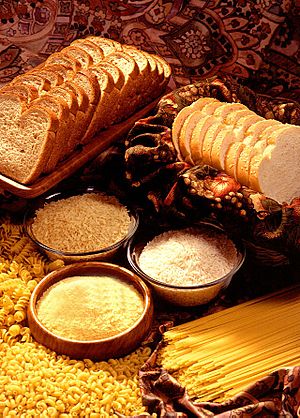Carbohydrate facts for kids

Carbohydrates are special chemical compounds. They are made of carbon, hydrogen, and oxygen. Think of them as tiny building blocks of sugars joined together. These sugars are also called saccharides. Carbohydrates are super important for giving energy to living things, like plants and animals.
Contents
What are the different types of carbohydrates?
Carbohydrates come in different types. They are grouped by how many sugar units they have.
- Simple Sugars: These have one or two sugar units.
- Complex Carbohydrates: These have many sugar units linked together.
- Oligosaccharides: These are short chains of sugar units. They are important for cell membranes.
- Polysaccharides: These are very long chains of sugar units. They store energy, like starch in plants and glycogen in animals. They also build structures, like cellulose in plants.
Why are carbohydrates important for your body?
Carbohydrates are the main source of energy for the human body. When you eat them, your body breaks them down to get the power it needs to run, play, and even think!
What happens if you eat too many carbohydrates?
Your body uses carbohydrates for energy. But if you eat more than your body needs, the extra carbohydrates can be changed into fat. This fat is then stored in your body.
Can you live without carbohydrates?
Yes, humans can live without eating carbohydrates. This is because your body can change proteins into carbohydrates if it needs to. Some cultures eat very few carbohydrates and still stay healthy.
What foods contain carbohydrates?
You can find carbohydrates in many different foods.
- Cereals: Like wheat, maize (corn), and rice.
- Vegetables: Such as potatoes.
- Fruits: Many fruits naturally contain sugars like glucose and fructose.
- Sugars: Table sugar (sucrose) is a pure carbohydrate.
- Other foods: Bread, milk, jam, biscuits, and cakes also have carbohydrates.
What are common carbohydrates in our diet?
The most important carbohydrates in our diet are starch and sugar.
- Starch is found a lot in potatoes, maize, rice, and other cereals.
- Sugar often appears as sucrose (table sugar). We add it to drinks and many prepared foods. Glucose and fructose are natural sugars found in fruits and some vegetables.
- Glycogen is a carbohydrate found in the liver and muscles of animals.
- Cellulose is a carbohydrate found in the cell walls of all plants. It's important for our diet as fibre, which helps our digestive system work well.
How much energy do people get from carbohydrates?
Studies in the United States and Canada show that people usually get about 40% to 60% of their energy from carbohydrates. However, some people get even more, around 55% to 75%. The amount of carbohydrates a person needs can depend on:
- Physical activity: The more you move and work, the more energy you need.
- Climate: Living in a cold place means your body needs more energy to stay warm.
Images for kids
-
D-glucose is a type of sugar. The red parts show an aldehyde group, and the blue parts show an asymmetric center.
-
Glucose can be shaped like a straight chain or a ring.
-
Sucrose, also known as table sugar, is made of two simpler sugars: D-glucose (left) and D-fructose (right).
-
Grain products like bread and pasta are great sources of carbohydrates.
See also
 In Spanish: Glúcido para niños
In Spanish: Glúcido para niños
 | Laphonza Butler |
 | Daisy Bates |
 | Elizabeth Piper Ensley |






